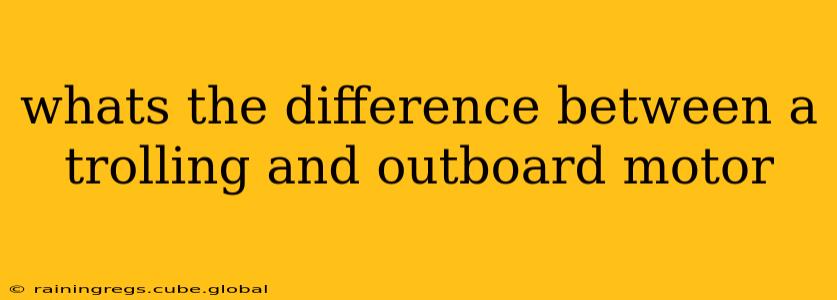What's the Difference Between a Trolling Motor and an Outboard Motor?
Choosing the right motor for your boat depends heavily on your needs and the type of boating you plan to do. Understanding the key differences between trolling motors and outboard motors is crucial for making the right decision. While both propel your boat, they differ significantly in power, purpose, and functionality.
What is a Trolling Motor?
A trolling motor is a smaller, lower-powered electric motor designed for slow, quiet propulsion, primarily used for fishing. Its quiet operation minimizes noise and vibrations, crucial for attracting fish. Trolling motors are typically mounted on the bow (front) of the boat, allowing for precise control and maneuverability in tight spaces. They offer various speed settings, allowing anglers to control their boat's speed precisely while trolling lures or drifting.
What is an Outboard Motor?
An outboard motor is a more powerful, typically gasoline-powered engine, usually mounted on the boat's stern (back). It provides significantly higher speeds and greater power than a trolling motor, ideal for navigating larger bodies of water or for faster recreational boating. Outboards are versatile, suitable for a broader range of boating activities, from watersports to cruising.
Here's a table summarizing the key differences:
| Feature | Trolling Motor | Outboard Motor |
|---|---|---|
| Power Source | Electric Battery | Gasoline (most common), Electric, or Hybrid |
| Power | Low | High |
| Speed | Low | High |
| Noise Level | Very Quiet | Significantly Louder |
| Mounting | Typically Bow (front) | Typically Stern (back) |
| Primary Use | Fishing, Precise maneuvering | General boating, Watersports, Cruising |
| Fuel Efficiency | High (electric) | Varies (lower for gasoline) |
| Maintenance | Relatively Low | Higher (especially for gasoline) |
What are the advantages of a trolling motor?
- Quiet Operation: Ideal for fishing, minimizing disturbance to fish.
- Precise Control: Enables slow, accurate maneuvering.
- Fuel Efficiency: Electric motors are very fuel-efficient, reducing running costs.
- Environmentally Friendly: Electric trolling motors produce zero emissions.
What are the advantages of an outboard motor?
- High Power & Speed: Suitable for various boating activities and larger bodies of water.
- Versatility: Can handle rougher water conditions and larger loads.
- Greater Range: Gasoline outboards generally offer longer operational times before refueling.
Can I use a trolling motor instead of an outboard motor?
Not for all situations. While a trolling motor is great for quiet fishing, it lacks the power and speed needed for many boating activities. Using a trolling motor for activities requiring high speeds or navigating challenging waters would be impractical and potentially unsafe.
Can I use an outboard motor instead of a trolling motor?
Technically yes, but it's highly inefficient. An outboard motor would be too loud and powerful for effective fishing, potentially scaring away fish. It also consumes significantly more fuel than a trolling motor, leading to higher operating costs.
In conclusion, the choice between a trolling motor and an outboard motor depends heavily on your boating needs. A trolling motor is excellent for quiet fishing, while an outboard motor provides the power and speed for a wider range of boating activities. Many boat owners use both a trolling motor and an outboard motor for maximum versatility.
